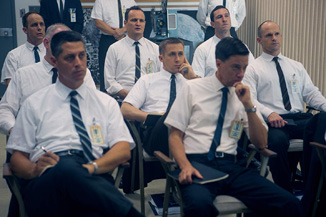|
|
Movie Review: First ManBy Felix QuinonezNovember 20, 2018
However, it would be a mistake to think that the movie glorifies or deifies Neil Armstrong. By showing his inability to open up to loved ones, First Man isn’t celebrating the idea of manhood as a solitary experience. It is in fact, subtly, renouncing that belief. We aren’t meant to walk away thinking that he was a superman for being able to “control” his emotions. Instead it is meant to show that once you get past the sanitized and romanticized memories of the hero, you’ll see a flawed individual who struggled like so many of us do. And that isn’t meant as a way to cut him down but instead to celebrate the fact that he was able to take such an important role in such a monumental accomplishment in spite of all that he was struggling with. Although the movie obviously takes place in the past, it still manages to be relevant and timely. We live in a time when people are constantly talking about recovering a “greatness” that we, as a nation, allegedly lost along the way. And First Man takes place in a decade that most believe America was truly “great.” In fact, many might call this time “the good old days.” It was a time when the American president spoke of a “new frontier.” American ingenuity was going to lead us all into a sci-fi like utopian future. But this nostalgic romanticism is not only a reductive but also a revisionist assessment. It flattens the era and airbrushes its blemishes. This is a natural result of nostalgia. Whenever we look back on anything, we automatically filter it through rose colored glasses and therefore add a level of artifice to the memories. And the movie tackles this in its own way. One of the most recurring images we see is that of the picturesque cul-de-sacs that the characters live in. These Norman Rockwell like neighborhoods are meant to represent or at least evoke the idea of the bright cheerful, nuclear family. But the picture-perfect family portraits, along with the ideal houses, represent a sanitized version of reality. It speaks to our habit of sweeping the inconvenient realities of life under the carpet and away from the public eye. And that is reflected in the way we choose to look at the past. The movie focuses on a very triumphant, monumental moment in human history but grief and mourning are, surprisingly, a big part of the story. Throughout the movie, teammates and friends lose their lives at an alarming pace and their losses weigh on the movie and characters. But it’s the death of Neil’s daughter, Karen that has the biggest impact on him. Karen’s death leaves a shadow that looms over the movie. In fact, it’s arguably one of his biggest motivations. It’s not until Neil reaches the surface of the moon that he can finally let go of her. It almost seems that his pain was so overwhelming that leaving the room to be alone wouldn’t be enough so he had to leave the whole planet behind to finally allow himself to grieve his daughter’s death. And the fact that the movie portrays the moon landing in such an ordinary way is itself remarkable. The scene could have been an easy way to tug at the hearts of viewers and also dazzle with visual effects. But instead, the movie resists the urge to frame the event like a summer popcorn movie set piece. It Instead, shows it like the culmination of hard work and perseverance in the face of almost constant failure. The scene gives the sense that it’s relief, not exhilaration, that they are feeling while achieving such an amazing feat. And again, the movie pulls off the great trick of both grounding the events and still reminding us how remarkable it all was. The wonder coexists with all of the baggage and in doing so, the movie manages to inspire all the same by reminding that it was done by regular people working together. It also accomplishes the difficult feat of showing a story that most people are familiar with in a new light and it is able to pay tribute to a hero while still portraying him as an ordinary man. Felix Quinonez Jr. is an independent comic book creator living in Brooklyn, NY. His self-published comic books and graphic novels have been sold in stores in NYC and online. He is the co-editor and contributor of a comic book Anthology called Emanata. That book features the work of many other talented creators from all around the country. You can check out his comic books and read more of his writing at https://theneonbulletin.com/.
|

|
|
|

|
Thursday, October 31, 2024
© 2024 Box Office Prophets, a division of One Of Us, Inc.


